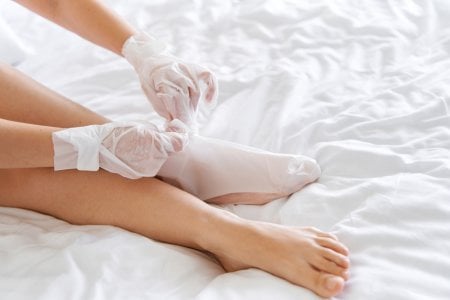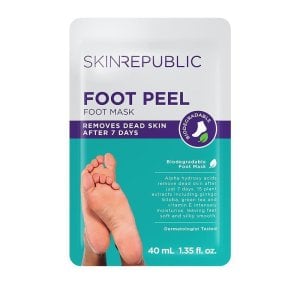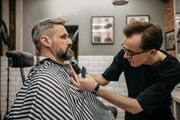This beauty trend could cost you a limb: ‘I’m really against it’
By
Seia Ibanez
- Replies 19
Social media has emerged as a hub for the latest trends and life tricks. While many of these viral sensations are harmless fun, some can be alarmingly dangerous, especially when masquerading as health or beauty advice.
The latest trend raising red flags among medical professionals is the use of foot peel masks, which, despite their popularity, could pose serious health risks.
The allure of these foot peel masks is undeniable. Promising baby-smooth skin, these products have captivated users worldwide, with the hashtag #FootPeelingMask garnering over 275 million views on social media.
The process seems simple enough: wear the chemical-laden fabric socks for a few hours, wash your feet, and then watch as the dead skin peels away over the course of a week to reveal soft, smooth soles.
However, the simplicity of this beauty regimen belies its potential dangers. Board-certified podiatrist Dr Jason Gold has voiced his concerns.
He warned that these masks can lead to several complications, including fungal or bacterial infections, allergic reactions, scarring, skin discolouration, and even nerve damage.
‘Many available peels contain acids and chemicals that may be unsafe, and if applied incorrectly with too much solution, the skin can burn and peel,’ he said.
‘This leaves the skin open and susceptible to bacteria, which can cause infections, and because shoes and floors are often unsanitary, bacteria can enter open skin lesions, leading to infections.’
For individuals with diabetes, neuropathy, or compromised immune systems, the risks are even higher.
Their skin is often not as resilient, and they may not feel the peel's effects due to loss of sensation, increasing the likelihood of chemical burns.
Sydney podiatrist Dr Nicki Dang has echoed these concerns on social media, emphasising that foot peels can't differentiate between dead and healthy skin, potentially leading to ulcers or wounds.
‘I’m really against using and recommending foot peels,’ Dr Dang said.
‘Although it does remove all the dead skin, it doesn’t know the difference between healthy and dead skin.’
In the worst-case scenario, such complications could escalate to sepsis and, tragically, amputation.
As we age, our skin's texture and strength naturally diminish, making us more susceptible to damage.
‘A person with neuropathy may not even feel the peel and may use too much, which increases the risk of a chemical burn,’ Dr Gold said.
Also, when people are immunocompromised, if they have a problem with the skin peel, their body may not be able to mount a healing response, leading to infection and poor skin healing.’
So, what's the safer alternative? Dr Gold advised that if you're determined to try a foot peel, start with a quarter or half of the solution.
‘It is recommended that you go to a licensed professional, such as a dermatologist or aesthetician, who uses tested products that are safe and effective and knows how to apply the products to provide the outcome you need without the risk of complication,’ he added.
In a similar story, an expert advised on how to maintain proper foot hygiene.
She said simply letting soapy water run over your feet in the shower is not enough to prevent infections. You can learn more about foot hygiene tips here.
 Have you or someone you know tried these viral foot peel masks? What was the experience like? Share your stories in the comments below!
Have you or someone you know tried these viral foot peel masks? What was the experience like? Share your stories in the comments below!
The latest trend raising red flags among medical professionals is the use of foot peel masks, which, despite their popularity, could pose serious health risks.
The allure of these foot peel masks is undeniable. Promising baby-smooth skin, these products have captivated users worldwide, with the hashtag #FootPeelingMask garnering over 275 million views on social media.
The process seems simple enough: wear the chemical-laden fabric socks for a few hours, wash your feet, and then watch as the dead skin peels away over the course of a week to reveal soft, smooth soles.
However, the simplicity of this beauty regimen belies its potential dangers. Board-certified podiatrist Dr Jason Gold has voiced his concerns.
He warned that these masks can lead to several complications, including fungal or bacterial infections, allergic reactions, scarring, skin discolouration, and even nerve damage.
‘Many available peels contain acids and chemicals that may be unsafe, and if applied incorrectly with too much solution, the skin can burn and peel,’ he said.
‘This leaves the skin open and susceptible to bacteria, which can cause infections, and because shoes and floors are often unsanitary, bacteria can enter open skin lesions, leading to infections.’
For individuals with diabetes, neuropathy, or compromised immune systems, the risks are even higher.
Their skin is often not as resilient, and they may not feel the peel's effects due to loss of sensation, increasing the likelihood of chemical burns.
Sydney podiatrist Dr Nicki Dang has echoed these concerns on social media, emphasising that foot peels can't differentiate between dead and healthy skin, potentially leading to ulcers or wounds.
‘I’m really against using and recommending foot peels,’ Dr Dang said.
‘Although it does remove all the dead skin, it doesn’t know the difference between healthy and dead skin.’
In the worst-case scenario, such complications could escalate to sepsis and, tragically, amputation.
As we age, our skin's texture and strength naturally diminish, making us more susceptible to damage.
‘A person with neuropathy may not even feel the peel and may use too much, which increases the risk of a chemical burn,’ Dr Gold said.
Also, when people are immunocompromised, if they have a problem with the skin peel, their body may not be able to mount a healing response, leading to infection and poor skin healing.’
So, what's the safer alternative? Dr Gold advised that if you're determined to try a foot peel, start with a quarter or half of the solution.
‘It is recommended that you go to a licensed professional, such as a dermatologist or aesthetician, who uses tested products that are safe and effective and knows how to apply the products to provide the outcome you need without the risk of complication,’ he added.
In a similar story, an expert advised on how to maintain proper foot hygiene.
She said simply letting soapy water run over your feet in the shower is not enough to prevent infections. You can learn more about foot hygiene tips here.
Key Takeaways
- Social media's viral beauty and healthcare trends can be dangerous and should be approached with caution, especially when they involve medical or health-related practices.
- Foot peel masks have become popular on social media, garnering millions of views, but experts warn that they could lead to infections, allergic reactions, scarring, or even amputation, particularly for those with diabetes or other underlying health issues.
- Podiatrists advise against using foot peel masks due to the risks, including sepsis and amputation, and emphasise that these products do not differentiate between healthy and dead skin.
- Health professionals recommend seeking treatment from licensed practitioners, such as dermatologists or aestheticians, who use safe and tested products rather than relying on potentially unsafe viral trends.









